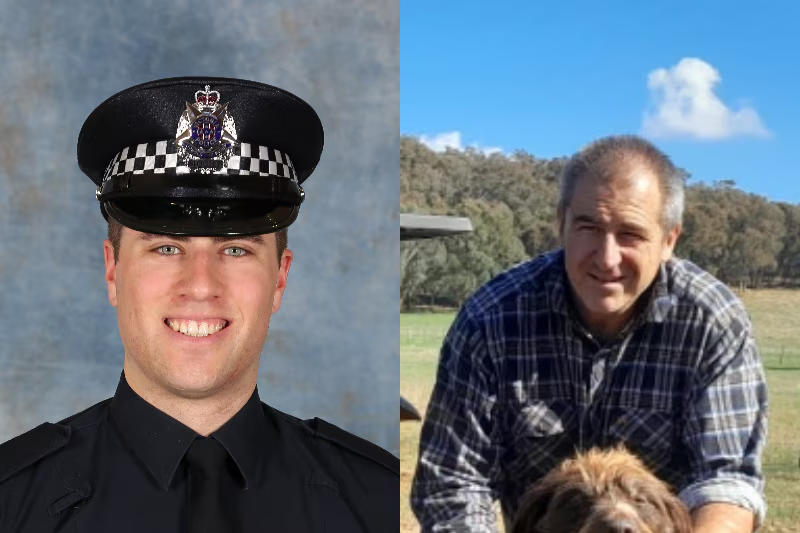
When 84-year-old Merelyne Robinson last received her home care visit three weeks ago, she had no idea it would be the last for the foreseeable future.
Living with mitochondrial myopathy in the small Victorian town of Porepunkah, she relied on daily welfare checks, assisted showers, and domestic support to maintain her independence.
The disappearance of alleged police killer Dezi Freeman into nearby alpine bushland changed everything.
The manhunt begins
The manhunt began on 26 August when Freeman allegedly opened fire on officers executing a warrant at his property, killing officers Neal Thompson and Vadim De Waart-Hottart.
For elderly residents like Mrs Robinson, the consequences extended far beyond the immediate crime scene, leaving them without essential support services for weeks.
Alpine Health suspended in-home services, meaning Mrs Robinson received only one visit in that period, during which two nurses assisted her shower while another stood guard at the front door.
'She sits there and thinks I might not be too bad, but what about everyone else around the place that might be worse off than me? She gets quite distraught at times.'
Her daughter Lynda, who worked long nursing shifts, felt torn between understanding the safety concerns and watching her mother struggle.
Alternative arrangements were offered—driving Mrs Robinson to Myrtleford for shower assistance—but the reality was stark: she did not drive, public transport was inaccessible, and no taxi services operated locally.
Community restrictions lifted, but seniors remain affected
Warnings against travelling to the Porepunkah area were lifted on 14 September, allowing children to return to school, local businesses to reopen, and tourists to visit again.
Yet for the most vulnerable residents, emergency measures remained in place.
Scale of the search
The unprecedented scale of the operation explained the ongoing restrictions.
Victoria Police deployed 450 officers, including more than 125 specialists from interstate and New Zealand, making it Australia’s largest tactical operation in history.
Rugged alpine terrain, dense bushland, natural caves, disused mineshafts, abandoned huts, and gorges complicated the search.
Freeman, an experienced bushman, was believed capable of surviving in the region for weeks.
National and international support</h3]
International and federal assistance supported the search.
Eleven New Zealand police officers were deployed to Victoria, while the Australian Federal Police, Australian Security Intelligence Organisation, South Australia Police, and NSW Police Force assisted Victoria Police.
The Australian Defence Force, Ambulance Victoria, and SES volunteers also contributed.
Current manhunt status
20 days since Freeman disappeared into bushland
Over 450 police officers deployed
$1 million reward offered—More than 1,100 tips received from public
No confirmed sightings since 26 August—International assistance from New Zealand, other Australian states
Impact on elderly residents
While most of Porepunkah returned to normal life, elderly residents remained effectively under siege.
Police suspected local knowledge of Freeman’s whereabouts, with Superintendent Brett Kahan stating, 'People have chosen, for whatever reason, not to come forward, and I'm taking this time to appeal to you to come forward'.
This added complexity for care providers, who worried not just about Freeman but potential accomplices who might threaten staff visiting isolated properties.
The crisis highlighted vulnerabilities in rural aged care, where single providers like Alpine Health serve entire communities and transport barriers limit access to alternative services.
Emergency planning and uncertainty
Discrepancies between lifting travel warnings for the general public while maintaining restrictions on elderly services reveal a need for more nuanced emergency planning.
Victoria Police confirmed public safety remained the priority, but Alpine Health appeared to adopt a more cautious stance, leaving families unsure when services might resume.
As the manhunt entered its fourth week, possibilities remained open: Freeman could still be in the area, be harboured, or be deceased.
Acting Deputy Commissioner Russell Barrett stated, 'The investigation by Victoria police will never end, we will always look for [Freeman] until he is located'.
Meanwhile, Alpine Health said it continued to follow advice from police and emergency services, without providing a timeline for service resumption.
Lessons for aged care and emergency management</h3]
This crisis offers lessons for emergency management and aged care in Australia, showing that resuming school activities while restricting elderly care fails to consider the most vulnerable.
Rural communities need contingency plans for prolonged service disruptions, such as agreements with neighbouring providers, family support networks, or temporary accommodation for those at highest risk.
[info]
If you or a family member relies on in-home care services, this situation highlights the importance of having an emergency plan.
Consider discussing with your care provider what protocols exist during emergencies, identifying alternative support sources, and ensuring family members understand care needs and routines.
Rural residents should be particularly proactive about emergency planning given the limited alternative services available.
[/info]
The Freeman manhunt will eventually end, but the questions it raises about protecting elderly Australians during extended crises will remain.
Residents like Merelyne Robinson continue to wait, isolated but not forgotten, as their community balances safety concerns against basic human needs.
What This Means For You
Elderly residents, like Merelyne Robinson, were left without essential care for weeks due to a large-scale police manhunt, highlighting how quickly support systems can be disrupted in emergencies.
Rural communities face unique vulnerabilities, including limited alternative providers and transport barriers, which make it even harder for seniors to access necessary services.
Emergency protocols, while designed to protect, can unintentionally isolate the most vulnerable, emphasising the need for tailored planning that considers both safety and accessibility.
Families can take proactive steps by developing care and emergency plans, ensuring that elderly loved ones have backup support and that their mental and physical health needs are addressed even during extended disruptions.
For readers over 60 or those caring for older family members, this situation serves as a reminder to review your emergency arrangements and discuss alternatives with your care providers before a crisis occurs.
The challenges faced by residents in Porepunkah highlight how changes in care services can have a profound impact on daily life and independence.
A recent story explores a major shake-up in home care services and what it means for those relying on support at home.
It offers a closer look at how policy changes can either provide a lifeline or create additional hurdles for people needing ongoing assistance.
Read more: New Aged Care Shake-Up Keeps Seniors at Home – Lifeline or Letdown?
Porepunkah police shootings — Details the incident on 26 August 2025 when Dezi Freeman allegedly opened fire on officers executing a warrant, killing two police officers.
https://en.wikipedia.org/wiki/Porepunkah_police_shootings
Porepunkah police shootings — Reports that travel warnings for the Porepunkah area were lifted on 14 September following the police shootings.
https://en.wikipedia.org/wiki/Porepunkah_police_shootings
Porepunkah shooting and search for Desmond Freeman (Filby) | Victoria Police — Covers the scale of the search, with 450 officers deployed, making it Australia’s largest tactical operation.
https://www.police.vic.gov.au/porepunkah-shooting-and-search-desmond-freeman-filby
NZ police join manhunt for accused Victoria cop-killer — Reports that eleven New Zealand police staff were deployed to assist in the search for Dezi Freeman.
https://www.1news.co.nz/2025/09/14/nz-police-join-manhunt-for-accused-victoria-cop-killer/
‘Come forward’: Search for accused Victoria cop-killer hits second week — Notes that police believe locals may know Freeman’s whereabouts and urged them to come forward.
https://www.1news.co.nz/2025/09/03/...accused-victoria-cop-killer-hits-second-week/
Victoria Police lift travel warning for Porepunkah as search for Dezi Freeman continues — NZ Herald — Police discuss possibilities including Freeman being in the area, harboured, or deceased.
https://www.nzherald.co.nz/world/vi...freeman-continues/NBJVS3DAEZHNRAJWU2RT4ST2CE/
Porepunkah police shootings — Describes the rugged alpine terrain and potential hideouts complicating the search for Freeman.
https://en.wikipedia.org/wiki/Porepunkah_police_shootings
Porepunkah police shootings — Mentions Freeman’s bushcraft experience and locals’ speculation he could survive in the mountainous region for weeks.
https://en.wikipedia.org/wiki/Porepunkah_police_shootings
Porepunkah police shootings — Lists federal and state law enforcement agencies assisting Victoria Police in the manhunt.
https://en.wikipedia.org/wiki/Porepunkah_police_shootings
Porepunkah shooting and search for Desmond Freeman (Filby) | Victoria Police — Confirms Alpine Health continued to follow advice from police and emergency services during the manhunt.
https://www.police.vic.gov.au/porepunkah-shooting-and-search-desmond-freeman-filby
Have you or your family been affected by disrupted care services during an emergency? How do you think communities can better support elderly residents during extended crises?







